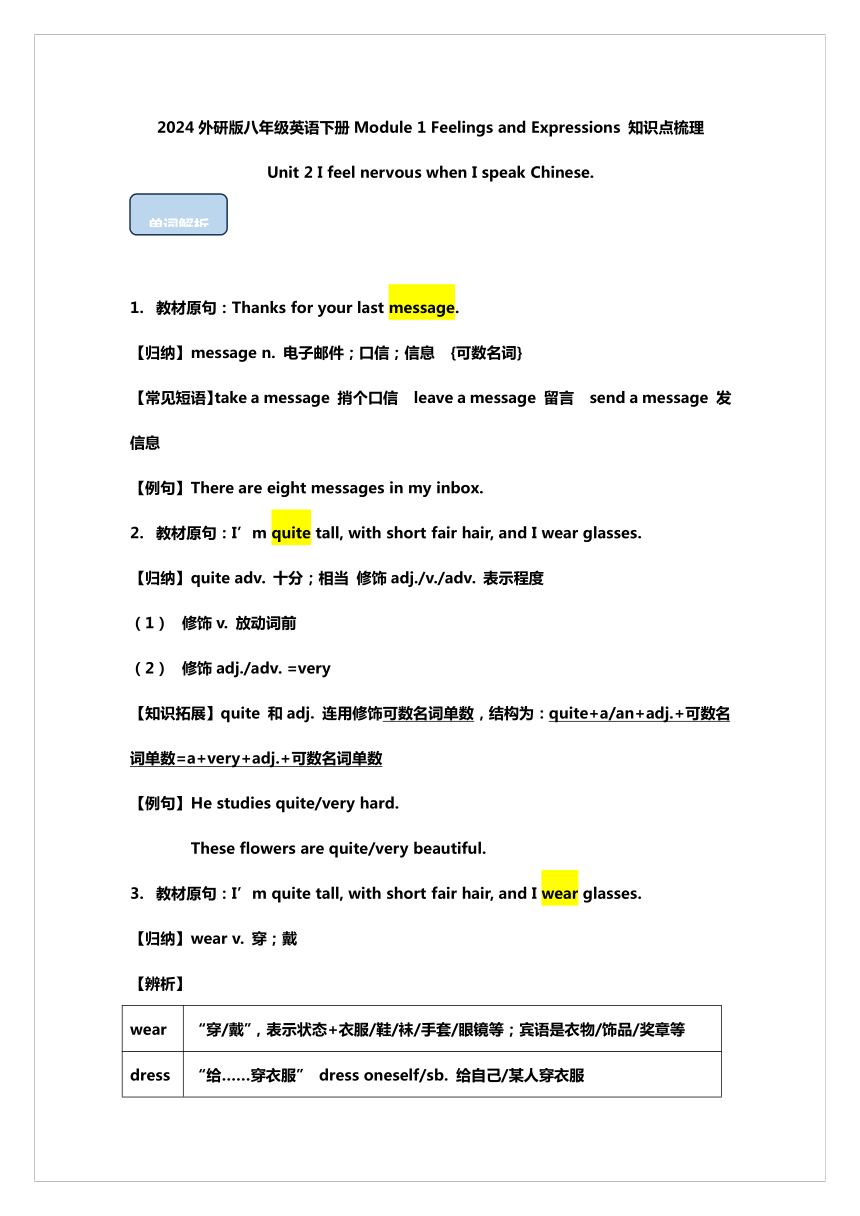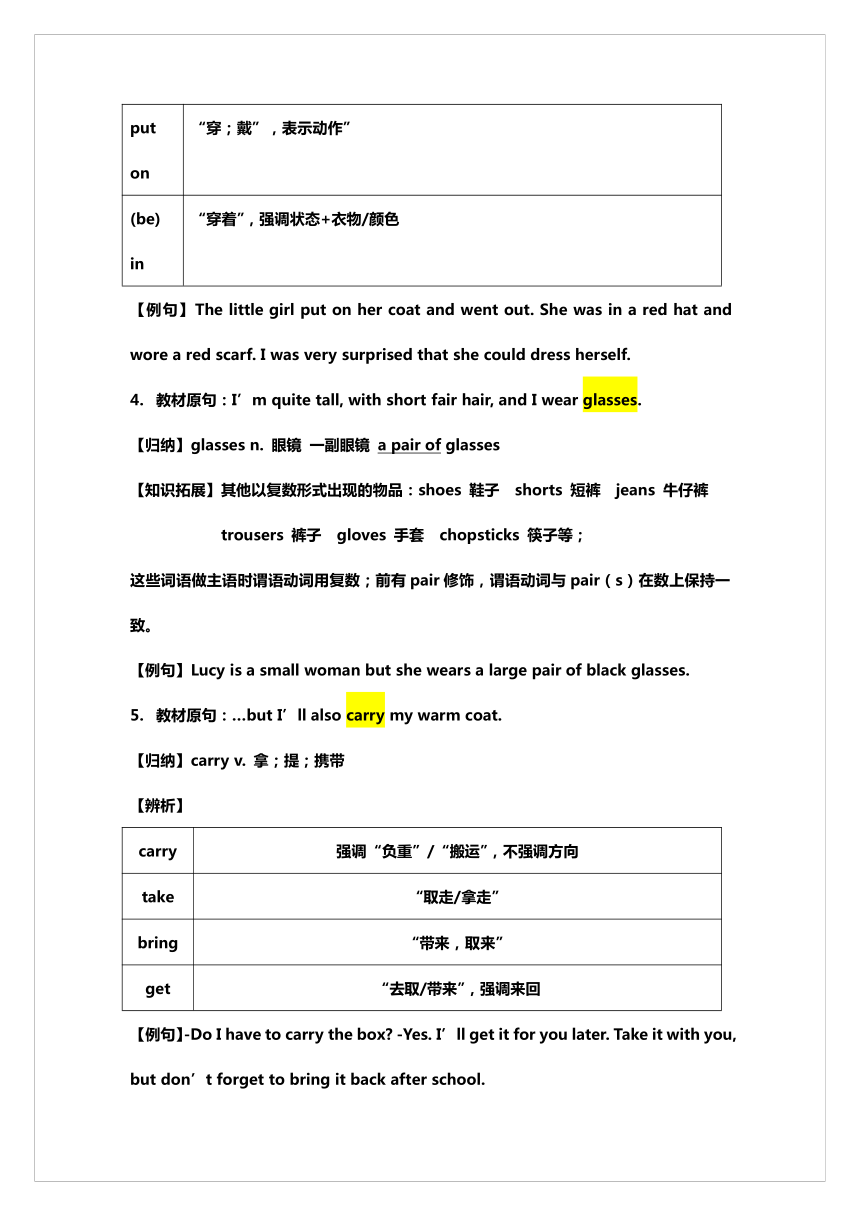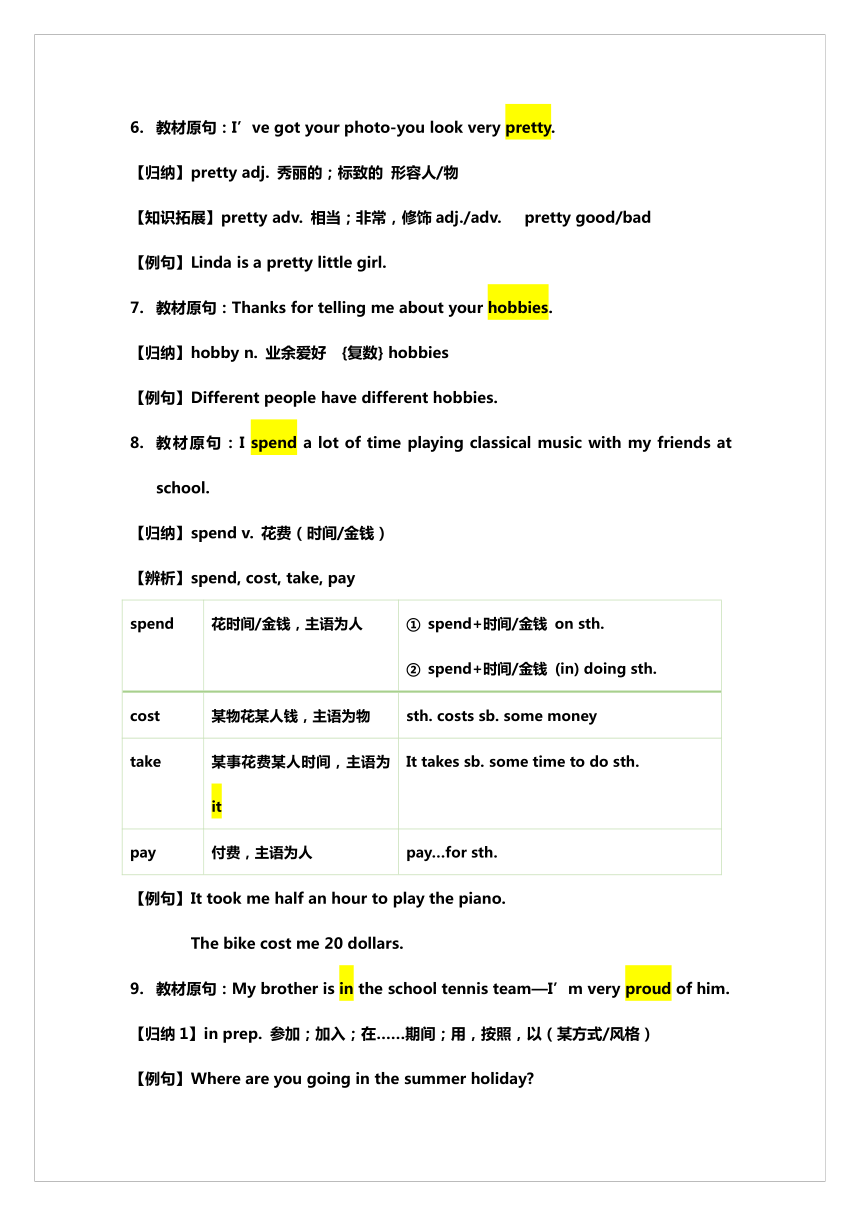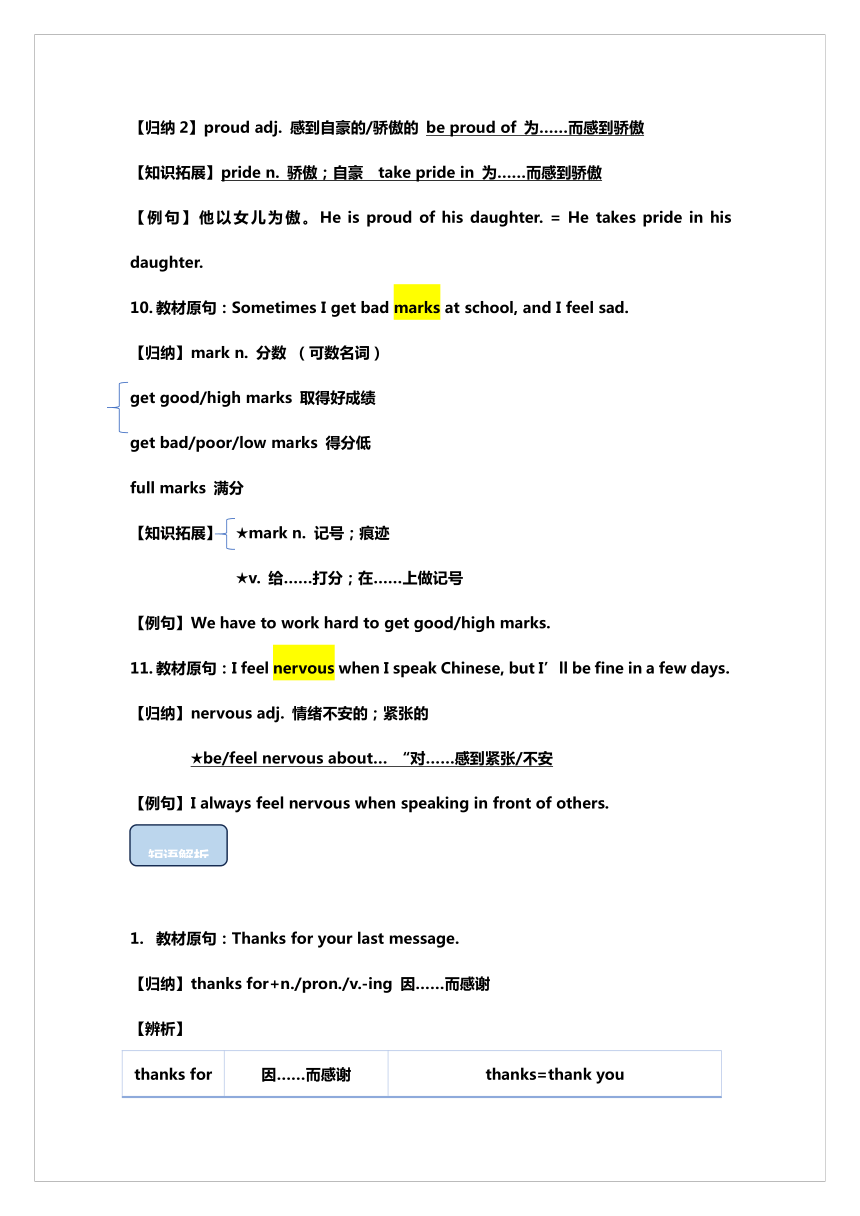外研版八年级下册Module 1 Feelings and Expressions Unit 2知识点梳理
文档属性
| 名称 | 外研版八年级下册Module 1 Feelings and Expressions Unit 2知识点梳理 |

|
|
| 格式 | docx | ||
| 文件大小 | 43.8KB | ||
| 资源类型 | 教案 | ||
| 版本资源 | 外研版 | ||
| 科目 | 英语 | ||
| 更新时间 | 2024-03-10 00:00:00 | ||
图片预览




文档简介
2024外研版八年级英语下册Module 1 Feelings and Expressions 知识点梳理
Unit 2 I feel nervous when I speak Chinese.
教材原句:Thanks for your last message.
【归纳】message n. 电子邮件;口信;信息 {可数名词}
【常见短语】take a message 捎个口信 leave a message 留言 send a message 发信息
【例句】There are eight messages in my inbox.
教材原句:I’m quite tall, with short fair hair, and I wear glasses.
【归纳】quite adv. 十分;相当 修饰adj./v./adv. 表示程度
修饰v. 放动词前
修饰adj./adv. =very
【知识拓展】quite 和adj. 连用修饰可数名词单数,结构为:quite+a/an+adj.+可数名词单数=a+very+adj.+可数名词单数
【例句】He studies quite/very hard.
These flowers are quite/very beautiful.
教材原句:I’m quite tall, with short fair hair, and I wear glasses.
【归纳】wear v. 穿;戴
【辨析】
wear “穿/戴”,表示状态+衣服/鞋/袜/手套/眼镜等;宾语是衣物/饰品/奖章等
dress “给……穿衣服” dress oneself/sb. 给自己/某人穿衣服
put on “穿;戴”,表示动作”
(be) in “穿着”,强调状态+衣物/颜色
【例句】The little girl put on her coat and went out. She was in a red hat and wore a red scarf. I was very surprised that she could dress herself.
教材原句:I’m quite tall, with short fair hair, and I wear glasses.
【归纳】glasses n. 眼镜 一副眼镜 a pair of glasses
【知识拓展】其他以复数形式出现的物品:shoes 鞋子 shorts 短裤 jeans 牛仔裤
trousers 裤子 gloves 手套 chopsticks 筷子等;
这些词语做主语时谓语动词用复数;前有pair修饰,谓语动词与pair(s)在数上保持一致。
【例句】Lucy is a small woman but she wears a large pair of black glasses.
教材原句:…but I’ll also carry my warm coat.
【归纳】carry v. 拿;提;携带
【辨析】
carry 强调“负重”/“搬运”,不强调方向
take “取走/拿走”
bring “带来,取来”
get “去取/带来”,强调来回
【例句】-Do I have to carry the box -Yes. I’ll get it for you later. Take it with you, but don’t forget to bring it back after school.
教材原句:I’ve got your photo-you look very pretty.
【归纳】pretty adj. 秀丽的;标致的 形容人/物
【知识拓展】pretty adv. 相当;非常,修饰adj./adv. pretty good/bad
【例句】Linda is a pretty little girl.
教材原句:Thanks for telling me about your hobbies.
【归纳】hobby n. 业余爱好 {复数} hobbies
【例句】Different people have different hobbies.
教材原句:I spend a lot of time playing classical music with my friends at school.
【归纳】spend v. 花费(时间/金钱)
【辨析】spend, cost, take, pay
spend 花时间/金钱,主语为人 ① spend+时间/金钱 on sth. ② spend+时间/金钱 (in) doing sth.
cost 某物花某人钱,主语为物 sth. costs sb. some money
take 某事花费某人时间,主语为it It takes sb. some time to do sth.
pay 付费,主语为人 pay…for sth.
【例句】It took me half an hour to play the piano.
The bike cost me 20 dollars.
教材原句:My brother is in the school tennis team—I’m very proud of him.
【归纳1】in prep. 参加;加入;在……期间;用,按照,以(某方式/风格)
【例句】Where are you going in the summer holiday
【归纳2】proud adj. 感到自豪的/骄傲的 be proud of 为……而感到骄傲
【知识拓展】pride n. 骄傲;自豪 take pride in 为……而感到骄傲
【例句】他以女儿为傲。He is proud of his daughter. = He takes pride in his daughter.
教材原句:Sometimes I get bad marks at school, and I feel sad.
【归纳】mark n. 分数 (可数名词)
get good/high marks 取得好成绩
get bad/poor/low marks 得分低
full marks 满分
【知识拓展】 ★mark n. 记号;痕迹
★v. 给……打分;在……上做记号
【例句】We have to work hard to get good/high marks.
教材原句:I feel nervous when I speak Chinese, but I’ll be fine in a few days.
【归纳】nervous adj. 情绪不安的;紧张的
★be/feel nervous about… “对……感到紧张/不安
【例句】I always feel nervous when speaking in front of others.
教材原句:Thanks for your last message.
【归纳】thanks for+n./pron./v.-ing 因……而感谢
【辨析】
thanks for 因……而感谢 thanks=thank you
thanks to 幸亏,多亏 +n./pron./v.-ing
【例句】感谢您的帮助。
2 教材原句:It’s great to hear from you, and I can’t wait to meet you.
【归纳】can’t wait to do sth. 迫不及待地想做某事
【知识拓展】can’t help doing sth. = can’t stop doing sth. 忍不住做某事
【例句】一位母亲给她的女儿买了一个风筝。女儿迫不及待地想放风筝。
教材原句:I enjoy sports as well, especially tennis.
【归纳】as well 也
【辨析】
too 肯定句 句末;前逗号可有可无
also 不用于否定句 行为动词前,be动词/助动词/情态动词后
as well 肯定句/疑问句 句末;前无逗号
either 否定句 句末,前逗号可有可无
【例句】他们也来吗?
我也喜欢读英语。
我妈妈也来了。
我不会游泳,我妈妈也不会游泳。
教材原句:He’s good at everything, but I’m not.
【归纳】be good at+n./pron./v.-ing 擅长= do well in
【知识拓展】good 构成的其他短语
be good for 对……有益 {反义短语} be bad for “对……有害“
be good to 对……友好 =be friendly/kind to sb.
be good with sb. 善于应付……的
【例句】他擅长打篮球。
做运动对我们的健康有益。
教材原句:I feel nervous when I speak Chinese, but I’ll be fine in a few days.
【归纳】in+一段时间 “在……之后”,与一般将来时连用,提问用how soon;
【辨析】in和after “在……之后”
in 将来时+时间段
after 将来时态+时间点
过去时态+时间点/时间段
教材原句:Oh, I’m afraid of flying too.
【归纳】be afraid of+n./pron./v.-ing 担心/害怕……
【辨析】
be afraid of doing sth. 担心/害怕做某事或会发生某事,实际未必发生
be afraid to do sth. 按经验/常识不敢去做或没勇气去做某事
【例句】他不敢大声说话,因为他担心会吵醒他的妈妈。
教材原句:But I can’t tell you how excited I am about going to China!
【归纳】be excited about+n./pron./v.-ing 对……感到兴奋
【辨析】excited/exciting
exited 兴奋的 描述人的主观感受,做表语/宾语补足语
exciting 令人兴奋的 修饰物,指事物的性质/特征,作定语/表语
【例句】我对这场令人激动的演唱会感到兴奋。
教材原句:She asked me to help her with her English homework because I am good at English.
【归纳】ask sb. to do sth. 要求某人做某事 ask ab. not to do sth. 要求某人不要做某事
【例句】昨晚,当我正在电视上看足球比赛时,爸爸要我停下来去做家庭作业。
教材原句:It’s great to hear from you, and I can’t wait to meet you.
【归纳】It+be+adj.+to do sth. 做某事是……的。
It+be+adj.+ for sb. +to do sth. 做某事对某人来说是……的。
【知识拓展】It+be+adj.+ of sb. +to do sth. 某人做某事是……的。(形容词是描述人的性格/品质的)
【例句】对我们来说保护环境很重要。
你帮助我真是太好了。
教材原句:How do you feel about coming to China
【归纳】How do you feel about+n./pron./v.-ing 询问对方对某人/某事的看法/感受/印象
=What do you think of…?/ How do you like…?
【例句】你觉得这场音乐会怎么样?
Unit 2 I feel nervous when I speak Chinese.
教材原句:Thanks for your last message.
【归纳】message n. 电子邮件;口信;信息 {可数名词}
【常见短语】take a message 捎个口信 leave a message 留言 send a message 发信息
【例句】There are eight messages in my inbox.
教材原句:I’m quite tall, with short fair hair, and I wear glasses.
【归纳】quite adv. 十分;相当 修饰adj./v./adv. 表示程度
修饰v. 放动词前
修饰adj./adv. =very
【知识拓展】quite 和adj. 连用修饰可数名词单数,结构为:quite+a/an+adj.+可数名词单数=a+very+adj.+可数名词单数
【例句】He studies quite/very hard.
These flowers are quite/very beautiful.
教材原句:I’m quite tall, with short fair hair, and I wear glasses.
【归纳】wear v. 穿;戴
【辨析】
wear “穿/戴”,表示状态+衣服/鞋/袜/手套/眼镜等;宾语是衣物/饰品/奖章等
dress “给……穿衣服” dress oneself/sb. 给自己/某人穿衣服
put on “穿;戴”,表示动作”
(be) in “穿着”,强调状态+衣物/颜色
【例句】The little girl put on her coat and went out. She was in a red hat and wore a red scarf. I was very surprised that she could dress herself.
教材原句:I’m quite tall, with short fair hair, and I wear glasses.
【归纳】glasses n. 眼镜 一副眼镜 a pair of glasses
【知识拓展】其他以复数形式出现的物品:shoes 鞋子 shorts 短裤 jeans 牛仔裤
trousers 裤子 gloves 手套 chopsticks 筷子等;
这些词语做主语时谓语动词用复数;前有pair修饰,谓语动词与pair(s)在数上保持一致。
【例句】Lucy is a small woman but she wears a large pair of black glasses.
教材原句:…but I’ll also carry my warm coat.
【归纳】carry v. 拿;提;携带
【辨析】
carry 强调“负重”/“搬运”,不强调方向
take “取走/拿走”
bring “带来,取来”
get “去取/带来”,强调来回
【例句】-Do I have to carry the box -Yes. I’ll get it for you later. Take it with you, but don’t forget to bring it back after school.
教材原句:I’ve got your photo-you look very pretty.
【归纳】pretty adj. 秀丽的;标致的 形容人/物
【知识拓展】pretty adv. 相当;非常,修饰adj./adv. pretty good/bad
【例句】Linda is a pretty little girl.
教材原句:Thanks for telling me about your hobbies.
【归纳】hobby n. 业余爱好 {复数} hobbies
【例句】Different people have different hobbies.
教材原句:I spend a lot of time playing classical music with my friends at school.
【归纳】spend v. 花费(时间/金钱)
【辨析】spend, cost, take, pay
spend 花时间/金钱,主语为人 ① spend+时间/金钱 on sth. ② spend+时间/金钱 (in) doing sth.
cost 某物花某人钱,主语为物 sth. costs sb. some money
take 某事花费某人时间,主语为it It takes sb. some time to do sth.
pay 付费,主语为人 pay…for sth.
【例句】It took me half an hour to play the piano.
The bike cost me 20 dollars.
教材原句:My brother is in the school tennis team—I’m very proud of him.
【归纳1】in prep. 参加;加入;在……期间;用,按照,以(某方式/风格)
【例句】Where are you going in the summer holiday
【归纳2】proud adj. 感到自豪的/骄傲的 be proud of 为……而感到骄傲
【知识拓展】pride n. 骄傲;自豪 take pride in 为……而感到骄傲
【例句】他以女儿为傲。He is proud of his daughter. = He takes pride in his daughter.
教材原句:Sometimes I get bad marks at school, and I feel sad.
【归纳】mark n. 分数 (可数名词)
get good/high marks 取得好成绩
get bad/poor/low marks 得分低
full marks 满分
【知识拓展】 ★mark n. 记号;痕迹
★v. 给……打分;在……上做记号
【例句】We have to work hard to get good/high marks.
教材原句:I feel nervous when I speak Chinese, but I’ll be fine in a few days.
【归纳】nervous adj. 情绪不安的;紧张的
★be/feel nervous about… “对……感到紧张/不安
【例句】I always feel nervous when speaking in front of others.
教材原句:Thanks for your last message.
【归纳】thanks for+n./pron./v.-ing 因……而感谢
【辨析】
thanks for 因……而感谢 thanks=thank you
thanks to 幸亏,多亏 +n./pron./v.-ing
【例句】感谢您的帮助。
2 教材原句:It’s great to hear from you, and I can’t wait to meet you.
【归纳】can’t wait to do sth. 迫不及待地想做某事
【知识拓展】can’t help doing sth. = can’t stop doing sth. 忍不住做某事
【例句】一位母亲给她的女儿买了一个风筝。女儿迫不及待地想放风筝。
教材原句:I enjoy sports as well, especially tennis.
【归纳】as well 也
【辨析】
too 肯定句 句末;前逗号可有可无
also 不用于否定句 行为动词前,be动词/助动词/情态动词后
as well 肯定句/疑问句 句末;前无逗号
either 否定句 句末,前逗号可有可无
【例句】他们也来吗?
我也喜欢读英语。
我妈妈也来了。
我不会游泳,我妈妈也不会游泳。
教材原句:He’s good at everything, but I’m not.
【归纳】be good at+n./pron./v.-ing 擅长= do well in
【知识拓展】good 构成的其他短语
be good for 对……有益 {反义短语} be bad for “对……有害“
be good to 对……友好 =be friendly/kind to sb.
be good with sb. 善于应付……的
【例句】他擅长打篮球。
做运动对我们的健康有益。
教材原句:I feel nervous when I speak Chinese, but I’ll be fine in a few days.
【归纳】in+一段时间 “在……之后”,与一般将来时连用,提问用how soon;
【辨析】in和after “在……之后”
in 将来时+时间段
after 将来时态+时间点
过去时态+时间点/时间段
教材原句:Oh, I’m afraid of flying too.
【归纳】be afraid of+n./pron./v.-ing 担心/害怕……
【辨析】
be afraid of doing sth. 担心/害怕做某事或会发生某事,实际未必发生
be afraid to do sth. 按经验/常识不敢去做或没勇气去做某事
【例句】他不敢大声说话,因为他担心会吵醒他的妈妈。
教材原句:But I can’t tell you how excited I am about going to China!
【归纳】be excited about+n./pron./v.-ing 对……感到兴奋
【辨析】excited/exciting
exited 兴奋的 描述人的主观感受,做表语/宾语补足语
exciting 令人兴奋的 修饰物,指事物的性质/特征,作定语/表语
【例句】我对这场令人激动的演唱会感到兴奋。
教材原句:She asked me to help her with her English homework because I am good at English.
【归纳】ask sb. to do sth. 要求某人做某事 ask ab. not to do sth. 要求某人不要做某事
【例句】昨晚,当我正在电视上看足球比赛时,爸爸要我停下来去做家庭作业。
教材原句:It’s great to hear from you, and I can’t wait to meet you.
【归纳】It+be+adj.+to do sth. 做某事是……的。
It+be+adj.+ for sb. +to do sth. 做某事对某人来说是……的。
【知识拓展】It+be+adj.+ of sb. +to do sth. 某人做某事是……的。(形容词是描述人的性格/品质的)
【例句】对我们来说保护环境很重要。
你帮助我真是太好了。
教材原句:How do you feel about coming to China
【归纳】How do you feel about+n./pron./v.-ing 询问对方对某人/某事的看法/感受/印象
=What do you think of…?/ How do you like…?
【例句】你觉得这场音乐会怎么样?
同课章节目录
- Module 1 Feelings and impressions
- Unit 1 It smells delicious.
- Unit 2 I feel nervous when I speak Chinese .
- Unit 3 Language in use
- Module 2 Experiences
- Unit 1 I've also entered lots of speaking competi
- Unit 2 They have seen the Pyramids.
- Unit 3 Language in use
- Module 3 Journey to space
- Unit 1 Has it arrived yet?
- Unit 2 We have not found life on any other planet
- Unit 3 Language in use
- Module 4 Seeing the docto
- Unit 1 I haven't done much exercise since I got m
- Unit 2 We have played football for a year now
- Unit 3 Language in use
- Module 5 Cartoons
- Unit 1 It's time to watch a cartoon.
- Unit 2 Tintin has been popular for over eighty yea
- Unit 3 Language in use
- Revision module A
- Module 6 Hobbies
- Unit 1 Do you collect anything ?
- Unit 2 Hobbies can make you grow as a person.
- Unit 3 Language in use
- Module 7 Summer in Los Angeles
- Unit 1 Please write to me and send me some photos
- Unit 2 Fill out a form and come to learn English
- Unit 3 Language in use
- Module 8 Time off
- Unit 1 I can hardly believe we are in the city ce
- Unit 2 We thought somebody was moving about
- Unit 3 Language in use
- Module 9 Friendship
- Unit 1 Could I ask if you've mentioned this to he
- Unit 2 I believe that the world is what you think
- Unit 3 Language in use
- Module 10 On the radio
- Unit 1 I hope that you can join us one day
- Unit 2 It seemed that they were speaking to me in
- Unit 3 Language in use
- Revision module B
